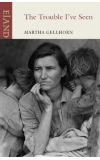
09 Nov 2012 23:23:30
In the early 1930s, before she was well known as a war correspondent, Gellhorn was sent to North Carolina by Roosevelt's Federal Emergency Relief Administration as one of a team of observers who would witness the misery being wrought by the great depression and report back to central government. These four novellas are a by-product of what must have been a harrowing experience. In these devastatingly quiet fictions, Gellhorn lays bare the psychology of abject poverty. More than the descriptions of hunger, cold, filth and disease, it's the loss of dignity and the deep, turned-in anger that make for almost unbearable reading. A little girl who longs for toothpaste so she can use the toothbrush she won at school has her innocence destroyed; a young couple in love have scant chance of a life together; family after family is ripped apart. Spare, simple and completely convincing, these stories not only contribute to the written record of the depression but give profound insights into the psychological suffering that poverty causes.

